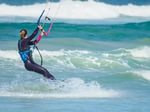Sailing
At 30, and a mother of two, kite boarder Justina Kitchen believes she has the mental stamina, experience – and luck – to finally see her Olympic dream come true.
When you’re a mum of two young girls, and the Paris Olympics – five years away – are firmly in your sights, it pays to arrange good babysitters.
Especially when one of them is an Olympic gold medallist – and your dad.
Justina Kitchen knows how fortunate she is to have the support of her parents, Bev and Rex Sellers, who look after her girls on Thursdays and Fridays each week, so she can head to the ocean and sail her kite board.
While a day at the beach may sound a little indulgent, for Kitchen it’s serious work (especially leaping in the water in the depths of winter).
Ranked No.10 in the world, Kitchen is determined to sail at the 2024 Paris Olympics, where kite boarding will make its debut.
Perhaps no-one could better understand what she has to go through than her dad. Rex Sellers won Olympic gold at the 1984 Los Angeles Games, sailing a Tornado with Chris Timms. Four years later, they won silver in Seoul.
Sellers actually sailed at four Olympics and, at the age of 68, is still sailing in world championships. Earlier this year, he competed at the Tornado worlds, sailed off Takapuna Beach, with Kitchen’s brother Brett. They finished fourth – one point off the bronze medal.
“Dad has always been absolutely amazing with us,” says 30-year-old Kitchen, who can remember walking around wearing her dad’s swag of medals as a kid.
“He’s always so keen to help me and my brothers in whatever we’ve been interested in.
“I remember being four years old, playing with Dad, and him telling me ‘you’re going to be such a good windsurfer because you’re so strong’.
“My earliest memory of being in a boat was of Dad putting me in an Optimist at about five and tying a rope to the front. I’d have to sail one way, and I didn’t know how to tack yet, so he’d just pull the rope to turn me, and I’d sail back the other way. He spent hours and hours doing that, up and down the beach.”
Did she have any idea as a kid what a legendary sailor her father was?
“Dad was just Dad. But then I started to see the way other people are interacting with him. You’re this little kid, and you’ve turned up to your first Opti regatta and everyone’s like, ‘Oh, that’s Rex Sellers’ daughter’,” Kitchen says.
“So in some ways it’s actually quite nice that I changed my name when I got married. So there’s not really any expectations on me.”
Her father has never tried to kite foil – the art of being propelled along by a large kite, cutting through the waves on a surfboard, which rises above the water thanks to a hydrofoil, like those on America’s Cup yachts.
But Sellers has plenty of wisdom from his own sailing career to pass on to his very capable daughter.
“Dad always says to me ‘you’re old for a bloody long time’,” Kitchen laughs. “He’s like ‘If you’ve got any opportunity to do it, just go and do it. It doesn’t matter if you’ve got kids, just make it work.’”
From him, she’s also learned to believe in herself, and be confident – something she knows a lot of athletes struggle with.
“It’s not really part of our New Zealand culture to back yourself. But Dad always told me the people he found the hardest to beat were those who really believed in themselves. Even now, if Dad gets in a boat on a start-line, he’s in it to win it.
“If you want to do it, you have to believe with every cell in your body that you’re going to win.”
It was that philosophy that helped bring Kitchen back to the sport in scorching form, after giving up on her Olympic dreams seven years ago.

After sailing in dinghies, but not always enjoying it, 15-year-old Kitchen was encouraged – by her mum, also a sailor – to give windsurfing a go. She took to it like the proverbial duck, and quickly found herself on the world stage sailing the new Olympic class board, the RS:X. She sailed at her first world champs at 17.
“I was quite lucky in a way. There were all these girls that had been racing for quite some time, but we were all learning this new board together, so it levelled the playing field,” she says.
But Kitchen realises now that she pushed herself too hard, too young – needing three shoulder reconstructions from injuries before she was 21.
Just as she was heading towards the front of international windsurfing fleets, Kitchen missed out on selection for the 2012 London Olympics. She started planning her next campaign with the help of Olympic champion Barbara Kendall, when suddenly windsurfing was thrown out, replaced by the new sport of kite boarding for the 2016 Rio Games.
She decided to give kiting a go, having a few lessons at home in Auckland, before jumping on a plane to the Cook Islands paradise of Aitutaki to kite board on her own – every day, twice a day, for three weeks. Five months later, Kitchen went to her first kite world champs, and finished 10th.
From feeling on top of the world, Kitchen’s spirits dipped again when the International Sailing Federation had a change of heart, and reinstated windsurfing for Rio.
“So I thought the Olympics just weren’t destined for me. Even if you’re really talented you also need luck,” she says.
She then turned her attention to other things in life. She married Chris Kitchen, a talented sailor in his own right – a world 18ft skiff champion, and an inventor – with his dad, Roger – of the Weta trimaran, the 2010 world sailing boat of the year.
After completing her degree, Kitchen worked as a podiatrist. And she had her daughters – Florentina, now four, and Lucette, who’s two.
In between the girls’ births, Kitchen decided to master the new form of kiting on a foil, just for fun, after her husband bought one.
Then when the sport was announced last November as a new sailing discipline at the 2024 Olympics, Kitchen decided it was time to make a comeback.
In May she finished 10th at the kite foiling world championships on Italy’s Lake Garda – proving she still had the skills, and the self-belief, to compete with the world’s best.

But she knows she has to keep lifting her game to stay among them over the next five years, so she’s training six days a week – anywhere in Auckland where the wind is blowing onshore.
Even though she has the full support of her parents, and her husband – who looks after the girls on weekends so Mum can train – Kitchen admits there are days when she just doesn’t feel like going near the sea.
“There are lots of days when I feel absolutely exhausted,” she says. “But I just have to push through it.
“And I think it’s almost an advantage being a mum, because you know what it’s like to be exhausted. I didn’t get any sleep for, like, two years, and my youngest had really bad colic as well. So for me to get up and go training when I’m a bit tired is like, ‘yeah, I can do this. I can do tired’.
“My competition are a bunch of 18 to 20 year olds who don’t know what true tired is. So I think it makes me tougher.”
Kitchen’s training partners are male kite boarders Sam Bullock and Lukas Walton-Keim, who are also among the best on the globe. But, on a number of levels, Kitchen would like more women to join their ranks.
Kite foiling at the Paris Olympics will be just one event – a mixed team relay, with one woman and one man in each nation’s team. Kitchen and Bullock raced the relay event at the world champs in Italy, and finished eighth. As it is now, Walton-Keim has no-one to race with in relay events.
“I would love to have a girl to train with,” Kitchen says. “We’re looking for people to start kiting, because it would be great just to have as many people on the water as possible.
“If someone is sailing an Optimist now, they might learn to kite just for fun. Then in a few years’ time they’ll have an option. For all those kids who find yacht racing gets a bit boring – they’ll stay kiting once they start.”
Kitchen is holding a kite boarding information morning at Takapuna Boating Club this Saturday.
Competition-wise, she has the European championships in Sardinia in September, followed by the World Beach Games – with Kendall as her chef de mission – in Doha.
So what is it that she loves about kite foiling?
“Normal sailing is really noisy and there’s water splashing everywhere. But when you pop up on a foil, it’s quiet and still, and you’re going twice as fast as you’ve ever been in any other boat,” says Kitchen, who estimates she reaches speeds of over 30 knots (or 55km/h).
“It’s really cool to know that you’re pretty much the fastest thing on the water [without a motor] other than an America’s Cup boat – for nowhere near as much money.”





Recent Comments